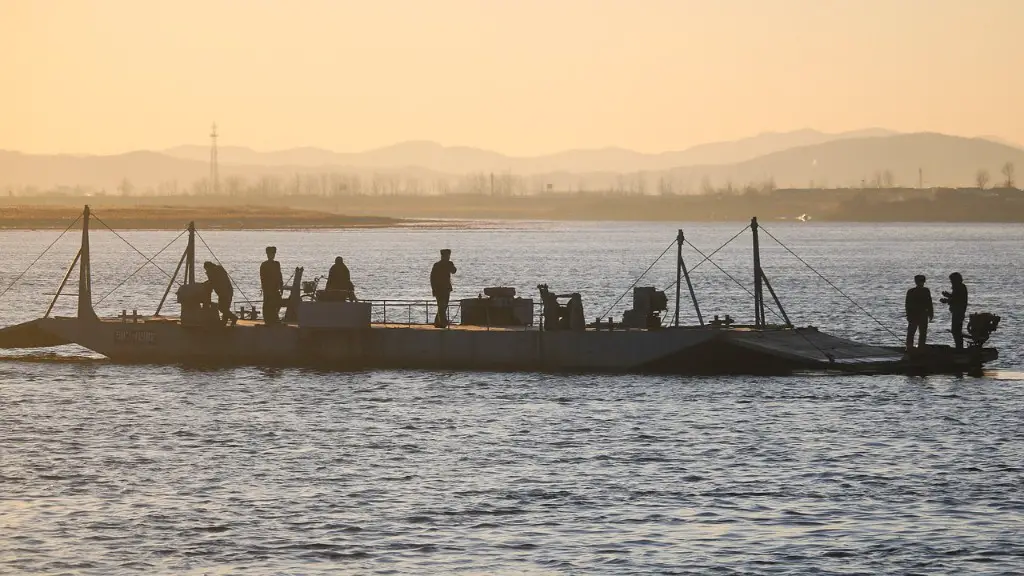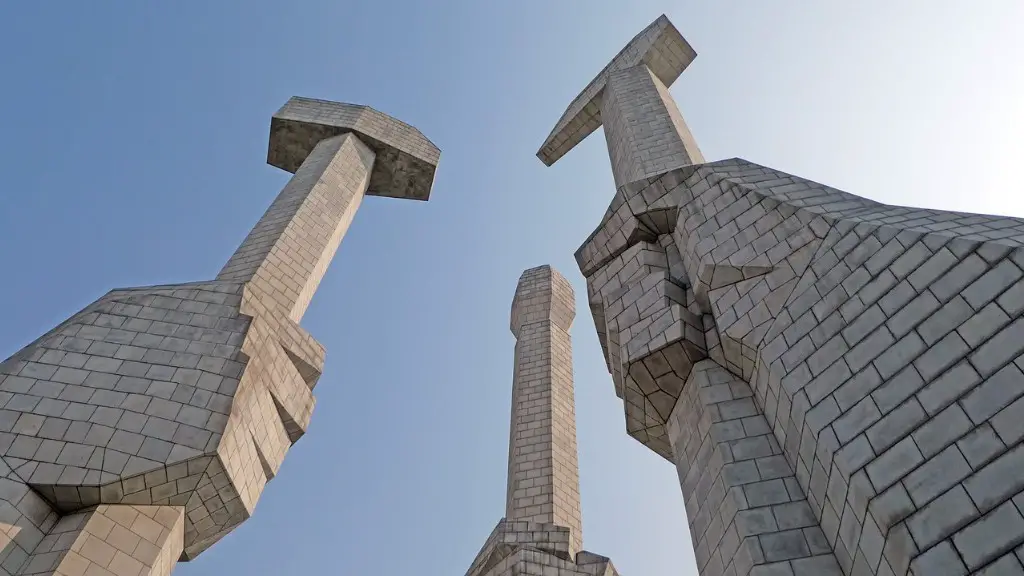Since the Korean War, China has been a close ally of North Korea. China has provided economic and military aid to North Korea, and has defended North Korea in the UN Security Council. Recently, however, China has been putting more pressure on North Korea to end its nuclear program. In response to North Korea’s most recent nuclear test, China voted for new UN sanctions against North Korea. China’s support for North Korea is not as strong as it used to be.
At this time, China is North Korea’s main ally, and is thought to be providing the country with economic and military support.
Is China allies with North Korea?
China is North Korea’s closest ally and they have a very close relationship. China often provides aid and assistance to North Korea, and the two countries have a mutual aid and co-operation treaty. This is the only defense treaty either country has with any nation.
The Soviet Union’s sponsorship of North Korea after the Korean War helped the country to develop its heavy-industrial backbone. Ninety-three North Korean factories were built with Russian technical assistance. This helped to make the Soviet Union the main trading partner and sponsor of North Korea.
Are Russia and China still allies
There is no doubt that Russia and China are strategic partners. However, whether or not this partnership constitutes an alliance is a matter of debate. Some commentators argue that the bilateral strategic partnership does not meet the criteria of an alliance, while others maintain that it does.
The main argument against the idea that the bilateral strategic partnership constitutes an alliance is that Russia and China have not officially declared their relations as such. While it is true that the two countries have cooperated closely on many issues, they have not formally committed to a mutual defense pact or any other type of agreement that would make their partnership an alliance.
Supporters of the idea that the bilateral strategic partnership does constitute an alliance point to the close cooperation between Russia and China on many fronts. They argue that the two countries have a shared interest in maintaining stability in their region and that they have worked together to achieve this goal. They also point to the fact that Russia and China have signed a number of agreements that commit them to cooperate on various issues.
Ultimately, whether or not the bilateral strategic partnership between Russia and China constitutes an alliance is a matter of debate. However, there is no doubt that the two countries are close partners with a shared interest in maintaining stability in their region.
The Japanese and Chinese people have a long history of conflict and disagreement. These days, the two groups are still not get along very well. There are many reasons for this, including different views on history and current geopolitical issues. As a result, relations between the Japanese and Chinese people are generally one of mutual hostility.
What countries don’t recognize North Korea?
North Korea is not recognized by 7 UN member states: Botswana, Estonia, France, Israel, Japan, South Korea, and the United States; one UN observer: Vatican City; as well as one non-UN member: Taiwan. This is due to North Korea’s independent status since 1948.
North Korea is often perceived as the “Hermit kingdom”, completely isolated from the rest of the world, but North Korea maintains diplomatic relations with 164 independent states The country also has bilateral relations with the State of Palestine, the Sahrawi Arab Democratic Republic, and the European Union. North Korea’s diplomatic relations play an important role in the country’s economy and political stability.
Who is Korea allies with?
The United States and South Korea have a long military alliance, aiding the US in every war since the Vietnam War, and most recently during the Iraq War. South Korea is a key ally of the United States in the Asia-Pacific region, and the two countries work closely together on a range of issues, including North Korea and regional security.
The United States and China remain in disagreement over the territorial issues in the South China Sea. China claims sovereignty over almost the entire area, while the United States views it as international waters and argues that its warships and aircraft have the right to operate in the region. These conflicting claims have led to tension and occasional incidents in the past, and the situation remains unresolved.
Which countries are friends of China
These countries are all located in the Asia-Pacific region. They are all members of the Association of Southeast Asian Nations (ASEAN), with the exception of Australia and Japan.
In recent years, China, the European Union, India, and Russia have been commonly described as potential superpowers. This is due to a variety of factors, including their large populations, rapidly growing economies, and expanding military capabilities. Japan was formerly considered a potential superpower as well, but its economic growth has slowed in recent years.
Who is the closest ally of Japan?
The United States is Japan’s closest ally, and the two countries share a strong partnership. The United States is committed to defending Japan and its interests, and the two countries work together on a range of issues including trade, security, and diplomacy. The United States is an invaluable partner to Japan, and our relationship is essential to the stability and security of the Asia-Pacific region.
Although Japan is not eligible to join the North Atlantic Treaty Organization (NATO) due to its geographical location, the country is still an important strategic partner for the alliance. Japan is a close friend and ally of the United States, and the two countries regularly cooperate on security matters. In addition, Japan is an important player in the Asia-Pacific region, and its involvement in regional security initiatives helps promote stability in the region.
Does Japan have nuclear weapons
In general, Japan does not pursue the development of weapons of mass destruction (WMD), in line with its pacifist principles. However, it should be noted that Japan does possess a full nuclear fuel cycle and has advanced WMD-relevant industries, which could be potential dual-use technologies. As a result, some experts have argued that Japan has the latent capability to develop WMD if it so chose.
The United States and North Korea have a long history of tension and hostility between them. The two countries do not have diplomatic relations and the Swedish Embassy in Pyongyang is the US protecting power. The embassy provides limited consular services to US citizens.
Why can US citizens not go to North Korea?
Since the detainment of American student Otto Warmbier in 2016, the US government has been concerned about the fate of its citizens if they travel to North Korea. In May of 2017, the US State Department released a travel warning to American citizens, advising them not to travel to North Korea due to the continuing serious risk of arrest and long-term detention. The situation in North Korea remains critical, and Americans should exercise increased caution if they choose to travel there.
The United Nations does not consider Taiwan and Kosovo to be sovereign countries; rather, they are considered to be part of China and Serbia, respectively. This is why these two countries are not members of the UN. Vatican City is the smallest country in the world and is not recognized as a sovereign state by many countries, which is why it is not a member of the UN.
Is China allies with South Korea
In 1983, diplomatic ties between South Korea and the Republic of China were severed. In August 1992, formal diplomatic relations were established between Seoul and Beijing.
North Korea has a military nuclear weapons program and, as of early 2020, is estimated to have an arsenal of approximately 30 to 40 nuclear weapons and sufficient production of fissile material for six to seven nuclear weapons per year.
The Democratic People’s Republic of Korea (DPRK) is believed to have begun a nuclear weapons program in the 1980s. In 1985, North Korea signed the Nuclear Non-Proliferation Treaty (NPT), but did not begin to cooperate with international inspections until 1991. In 1993, North Korea announced its withdrawal from the NPT, but in 1994 agreed to a US-DPRK deal in which it plutonium production would be frozen in return for the US providing two light water reactors.
However, construction of the reactors was never completed, and in 2002 North Korea admitted to running a secret uranium enrichment program. In 2003, North Korea withdrew from the NPT, and in 2006 it conducted its first nuclear weapon test.
Since then, North Korea has conducted several more nuclear weapon tests, as well as tests of ballistic missiles that could potentially be used to deliver nuclear weapons. In 2017, it was estimated that North Korea had a total of 20 to 30 nuclear weapons.
The US
Conclusion
There is no clear evidence that China is currently supporting North Korea. However, China has traditionally been one of North Korea’s strongest allies, and it is possible that they are still providing some level of support.
The evidence does not currently support the claim that China is secretly supporting North Korea. While it is true that China has been North Korea’s closest ally for many years, there is no concrete evidence to suggest that they are currently supporting them in a significant way. Additionally, China has been taking steps in recent years to distance themselves from North Korea, suggesting that they are not as close as they once were.





